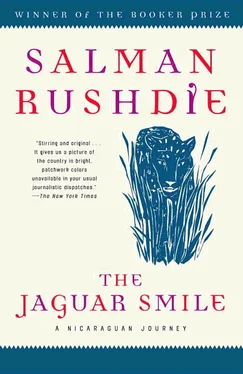Daniel Ortega finished pleading for justice at the UN, while, without his knowing it, the dance of death in Nicaragua took another of its slow, grave steps.

SILVIA: AN EPILOGUE
On the plane home I sat beside a Nicaraguan woman with a soft face, thick spectacles and a streaming cold. She was married to a Frenchman and now lived in Paris. We spoke in French, and I soon realized that she was in a distraught state.
I had asked her if she returned to Nicaragua often. (She had left just before the ’72 earthquake, so that ‘her’ Managua had largely vanished. Only the photograph of old Managua at the Los Antojitos café really reminded her of home.)
‘Yes,’ she said, ‘my mother lives there, I just went to visit her, but two days before I arrived she, she, died.’ She began to weep, then controlled herself as if bored by her tears. ‘They kept the body until I came.’ I made inadequate noises, how tragic, how did it happen, you must feel awful.
She felt her mother’s medical treatment had not been up to the mark. The cause of death had been a thrombosis, a huge clot in a major artery, but radiology had failed to detect anything; they hadn’t seen the clot. ‘They said the picture wasn’t clear. Some equipment, some fluids were lacking, because of the shortages, the economic blockade by the US.’
Silvia blamed the government. ‘I come from a Sandinista family. Both my brothers are active in the Frente, also before the triumph. But now I go back and I see the same old habits of the Somoza time creeping back.’
For instance? ‘For example, there was an arts and crafts exhibit at the ruins of the Grand Hotel. The first day it was not open to the public, but by invitation only. The second day, you found out that all the best pieces had already been reserved. That was how Hope Somoza used to behave.’
‘Yes, I see,’ I said, not having expected so sudden a change of subject.
‘Also the prices of primitive paintings have gone through the roof,’ she said. ‘And the transport system in Managua is appalling.’
I asked if her husband had ever been to Nicaragua. ‘Yes,’ Silvia said, ‘but there is the problem of the expense of the air tickets, and besides it is hard to bring my whole family; one simply cannot find domestiques , and there are no automatic washing machines, one must wash everything by hand, and there is the ironing, and the cooking, and everything.’
She was a good-hearted woman, in spite of the sound of the above. She had trained as an architect and had gone to Europe to complete her studies. ‘Everyone told me I’d never come back. I had dreamed for years of being in all that grandeur, all that splendour of buildings. But I never thought I’d stay away. Then things happened very quickly, and I was married, and there it was.’
Did she have a vote in Nicaragua? No, she said, she lived abroad, but her family had all voted for the Frente. ‘And now?’ I asked. ‘Would they vote for the Frente again, or have they changed their minds?’
‘No, no, they haven’t,’ she said. ‘But things are wrong, everybody knows that.’
She opposed the closure of La Prensa and thought, as I did, that Barricada was the most boring paper she’d ever seen. She felt the FSLN leaders didn’t really understand why the freedom of the press was so important. ‘They are boys, who went from school to the mountains to jail or into exile. Are they really properly prepared for the running of a State?’ And then, in another of her vertiginous non sequiturs: ‘Taxi drivers in Managua these days! They charge the earth. There is supposed to be a rate, but they ignore it, and there is nothing anyone can do. Nothing. It’s wrong.’
As she dozed, wisps of Nicaragua floated through my mind in the eddying, repetitious fashion of airplane thoughts. How isolated from information it was. ‘England?’ a campesino asked me, and then struggled to offer some piece of knowledge about the place. ‘Sí, sí: Reina Isabel, no?’ And India, to most Nicaraguans, always excepting the followers of Rabindranath, seemed an exotic, camelious, elephantine place; they were amazed when I drew parallels between that fantasyland and their own country. And yet those parallels did exist. The three tendencies of the FSLN, for example, echoed the divisions and arguments in the Indian left, and in many other poor countries of the South. There were also differences. India was poorer than Nicaragua, but not nearly so information-poor. Very little foreign news made the pages of Barricada and El Nuevo Diario during my stay. ‘Torrijos was assassinated by the CIA.’ ‘US, UK spy on ANC for South Africa.’ ‘Royal wedding stages a distraction from the quarrel between Reina Isabel and Mrs Thatcher.’ That was about it.
To tell the truth, Nicaraguans didn’t seem perturbed by the absence of the world. Their own circumstances absorbed them so deeply that they had little room left for curiosity. Very few people asked me any questions, though they were all happy to answer mine. History was roaring in their ears, deafening them to more distant noises.
‘History,’ in Veronica Wedgwood’s phrase, ‘is lived forward but it is written in retrospect.’ To live in the real world was to act without knowing the end. The act of living a real life differed, I mused, from the act of making a fictional one, too, because you were stuck with your mistakes. No revisions, no second drafts. To visit Nicaragua was to be shown that the world was not television, or history, or fiction. The world was real, and this was its actual, unmediated reality.
I had left Nicaragua unfinished, so to speak, a country in which the ancient, opposing forces of creation and destruction were in violent collision. The fashionable pessimism of our age suggested that the destroyers would always, in the end, prove stronger than the creators, and, indeed, those who would unmake the Nicaraguan revolution were men of awesome power. The new weapons of the counterrevolution, purchased with the US dollars, were moving into place; soon it would be time for battle. The logic of realpolitik said that there could only be one result: now that the US had opted for a straightforward military solution in Nicaragua, its might would eventually prevail. But that kind of logic had proved fallible in the past. Unhappy endings might seem more realistic than happy ones, but reality often contained a streak of fantasy that realism (pace Tagore) lacked. In the real world, there were monsters and giants; but there was also the immeasurable power of the will. It was entirely possible that Nicaragua’s will to survive might prove stronger than the American weapons. We would just have to see.

‘One worries for the future,’ Silvia said after a time. ‘Because if the Contra come to power the Sandinistas will go into the mountains and become guerrillas again, so it’s endless, no?’ I suggested that if the revolution managed to outlast Reagan, his successor might follow a different line, and without US support the Contra weren’t much to worry about. She looked dubious but was too polite to disagree openly. ‘It’s possible, what you say,’ she said, without conviction.
I asked my well-worn question: ‘What do you think the government should do, then? Should it try and make peace with the Americans?’
‘You said “Americans”,’ she reproached me.
‘I’m sorry. North Americans. Unitedstatesians. Reaganians. Them.’
‘It’s all right,’ she forgave me quickly. ‘When I first came to Europe from Nicaragua, it would shock me to hear the US called “America”. I wanted to protest, But we are America, not just them. But now I say it too: America, Americans. Europe teaches you a different perspective.’
Читать дальше












